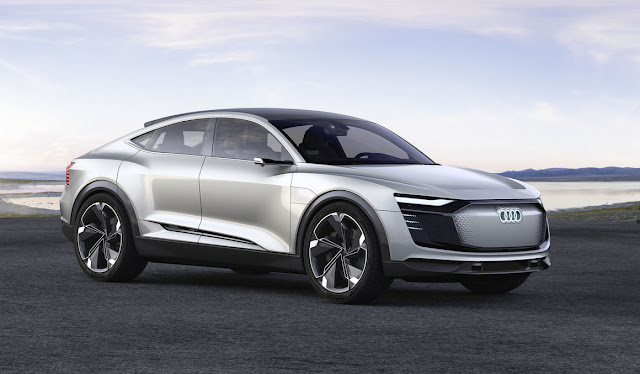Gran Turismo Audi e-tron Sportback
Design study and technology demonstrator, electric car and power pack in the guise of a coupé: Audi presents a versatile concept car at the Auto Shanghai this spring. The four-door Gran Turismo Audi e-tron Sportback concept comes with a 320 kW electric drive. The formal idiom combines classic Audi elements with an array of trendsetting details: an electrifying architecture, tailored consistently to the technology and the package of the electric drive.Emotional and powerful: Audi coupé design
In an initial encounter with new forms, the eye seeks out familiar elements. The design of the Audi e-tron Sportback offers these from every perspective – yet it also springs surprises with radically new lines and solutions. One example is the front end of the electric automobile. It still sports the Singleframe, which has been the distinguishing feature of every Audi since 2003.Now, however, its design acknowledges that the function of a classic radiator grille has become obsolete: The electric motor at the front needs nothing like the amount of air that a combustion engine does – so the large opening at the front of the car is no longer required.
Behind the familiar octagon of the Singleframe, with its overtly wide, horizontal cut, there is a large-area panel painted in the body color. Its sculptural surface has a structured pattern emblazoned with the four rings logo – just like the grille of the classic Audi Singleframe.
The edges of the central surface are drawn back, allowing air to flow through at the top. The air inlet is bracketed again by an octagonal, black-painted frame that structures almost the entire width of the front end. Between the front lid extending low down, the front apron and the wheel arches, it combines with the light units to give this Audi an unmistakable face.
The four wheel arches with pointedly horizontal top edges extend well out from the cabin. They shape the conspicuous quattro architecture – not just by providing visual evidence of a wide track and dynamic potential, but also by binding the e-tron Sportback into the brand’s DNA. Large 23-inch wheels in a technical 6-spoke design highlight the confident presence of the imposingly dimensioned coupé. An exterior length of 4.90 meters (16.1 ft), a width of 1.98 meters (6.5 ft) and a height of 1.53 meters (5.0 ft) with a wheelbase of 2.93 meters (9.6 ft) position the e-tron Sportback in the C segment, close to the Audi A7.
Small cameras replace the exterior mirrors. This technology offers other advantages besides improved air flow and reduced wind noise. The blind spot of the physical exterior mirror is virtually eliminated, as is the obstruction to the diagonal forward view. The camera images are shown on separate displays in the doors. Audi is showing this technology as a concrete foretaste of the production version.
The rear section is kept very neat, with a wide light strip and a prominent separating edge. Here again, the determined horizontality of the quattro wheel arches dominates the proportions. The rear diffuser is visible below the bumper.
Power Unit and Performance
The Audi e-tron Sportback concept technology study uses three powerful electric motors – one on the front axle and two on the rear axle. Total output is 320 kW, with boosting enabling the driver to temporarily mobilize up to 370 kW.
The electric motors are highly efficient over a wide engine speed range, including at low and intermediate load. They thus combine emotional driving pleasure above all with a high range. The electric motors are liquid-cooled, as are the compact power electronics.
320 kilowatts of power – which can even reach 370 kW in the boost mode – provide a fitting level of propulsion, with the sprint from 0 to 100 km/h (62.1 mph) a done deal in just 4.5 seconds. With the battery’s energy content of 95 kilowatt-hours, its range is in excess of 500 kilometers (310.7 miles) (NEDC). More than 800 Nm (590.0 lb-ft) of torque are available in the boost mode. The sprint from zero to 100 km/h (62.1 mph) is completed in 4.5 seconds; the electronically limited top speed of 210 km/h (130.5 mph) is quickly reached. In the standard D driving program, the e-tron Sportback musters 320 kW.
The concept with the two electric motors on the rear axle offers major advantages when it comes to sporty handling. The Torque Control Manager, which works together with the Electronic Stabilization Control (ESC), actively and variably distributes the power between the wheels as necessary. This torque control provides for maximum dynamics and stability. Thanks to the virtually instantaneous response of the electric motors, the control actions are lightning-quick. The drive concept of the Audi e-tron Sportback concept adapts perfectly to every situation, whether involving transverse or longitudinal dynamics.
Interior
In its consciously light-colored interior the Audi e-tron Sportback concept offers a blend of functional clarity and reductive controls as a formal principle. Expansive touch-sensitive screens below the central display, on the center console and in the door trims supply information and interact with the on-board systems. Horizontal surfaces on the dashboard and the seemingly floating center console convey a sense of open perspectives for the occupants of the four individual seats.The entire interior is focused on the driving area and controls. The large black-panel display surfaces behind the steering wheel and on the center console appear black when inactive, and turn live together with their display elements as soon as the car is started – a design that is reminiscent of the minimalist screen-based cockpits of modern commercial aircraft.
Price and Release Date
The production version of this pioneering electric SUV will appear on the market in 2018. The Audi e-tron Sportback concept will be followed by its production version in 2019.Source: https://www.audi-mediacenter.com/en/audi-e-tron-sportback-concept-7638













Sem comentários:
Enviar um comentário